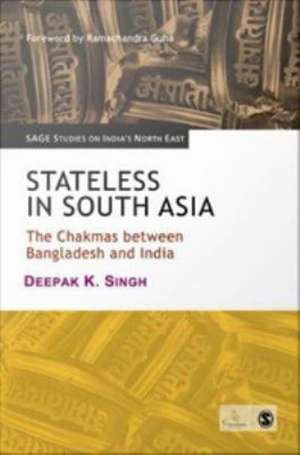Stateless in South Asia: The Chakmas between Bangladesh and India: SAGE Studies on India's North East
Autor Deepak K. Singhen Limba Engleză Electronic book text – 24 iun 2018
Setting a new dimension in refugee studies, the arguments in this book are developed on the framework of oral narratives, incorporating the self perceptions of both the Chakmas as well as the Arunachalis who host them. The book critically analyses national and international official documents and policy statements and demonstrates the absence of legal-institutional and legislative structures to address the concerns of refugees. It throws into relief the sharp contestations over nationalism, citizenship and ethnicity in South Asia, both at the level of political movements and academic discourse. It sheds new light on the outcomes of partition, boundary making and state formation, as well as dominant development models by examining the everyday experiences of these communities.
This book will be a useful resource for scholars and students of politics, international relations, sociology, anthropology and history. It will also help policy makers and lawyers.
Din seria SAGE Studies on India's North East
- 22%
 Preț: 441.88 lei
Preț: 441.88 lei -
 Preț: 107.77 lei
Preț: 107.77 lei -
 Preț: 247.97 lei
Preț: 247.97 lei -
 Preț: 296.19 lei
Preț: 296.19 lei -
 Preț: 146.66 lei
Preț: 146.66 lei -
 Preț: 296.19 lei
Preț: 296.19 lei -
 Preț: 296.19 lei
Preț: 296.19 lei -
 Preț: 296.19 lei
Preț: 296.19 lei -
 Preț: 344.87 lei
Preț: 344.87 lei -
 Preț: 185.53 lei
Preț: 185.53 lei -
 Preț: 185.53 lei
Preț: 185.53 lei -
 Preț: 386.36 lei
Preț: 386.36 lei -
 Preț: 344.87 lei
Preț: 344.87 lei -
 Preț: 344.87 lei
Preț: 344.87 lei -
 Preț: 344.87 lei
Preț: 344.87 lei
Preț: 296.19 lei
Nou
Puncte Express: 444
Preț estimativ în valută:
50.01€ • 52.35$ • 41.38£
50.01€ • 52.35$ • 41.38£
Indisponibil temporar
Doresc să fiu notificat când acest titlu va fi disponibil:
Se trimite...
Preluare comenzi: 021 569.72.76
Specificații
ISBN-13: 9788132104940
ISBN-10: 8132104943
Pagini: 320
Dimensiuni: 140 x 216 mm
Ediția:First Edition
Editura: SAGE Publications
Colecția Sage Publications Pvt. Ltd
Seria SAGE Studies on India's North East
Locul publicării:New Delhi, India
ISBN-10: 8132104943
Pagini: 320
Dimensiuni: 140 x 216 mm
Ediția:First Edition
Editura: SAGE Publications
Colecția Sage Publications Pvt. Ltd
Seria SAGE Studies on India's North East
Locul publicării:New Delhi, India
Recenzii
This
reviewer
firmly
believes
that
the
book
definitely
will
help
researchers
of
different
subjects
to
explore
an
area
which
has
remained
isolated
and
unknown
even
in
other
parts
of
northeast
India…
offering
hopes
to
both
Chakmas
and
Arunachalees,
especially
by
opening
a
strong
debate,
through
questioning
why
there
is
no
solution
to
these
people’s
predicaments
even
after
fifty
years
of
refugeehood.
Singh provides a detailed account of the conflict between the Chakmas and the Arunachalees. The authenticity of the book lies in methodology…Singh effectively opens up a strong debate by questioning why there is no solution to the refugee problem even after 50 years of refugeehood.
Singh provides a detailed account of the conflict between the Chakmas and the Arunachalees. The authenticity of the book lies in methodology…Singh effectively opens up a strong debate by questioning why there is no solution to the refugee problem even after 50 years of refugeehood.
Cuprins
Foreword
Ramachandra
Guha
Preface
Chakma Refugees: Partition Residues and Development Victims
CHT AND NEFA: From Colonial Outposts to Post-colonial Peripheries
Politics of Demographic (Dis)Order in Northeast India: The Idiom of Protest
Chakma Diaspora in Northeast India: Excluded Communities, Fragmented Identities
Official Discourses of the Chakma Issue: Centre versus State
Chakmas' Self-perceptions: Understanding Everyday Lived Experiences of Refugees
Arunachalis' Self-perceptions: Assertion and Reconstruction of Identity and Ethnic Nationalism
The Making of Refugees in South Asia: Nation, State and Outsiders
Interrogating India's Refugee policy
References
Index
Preface
Chakma Refugees: Partition Residues and Development Victims
CHT AND NEFA: From Colonial Outposts to Post-colonial Peripheries
Politics of Demographic (Dis)Order in Northeast India: The Idiom of Protest
Chakma Diaspora in Northeast India: Excluded Communities, Fragmented Identities
Official Discourses of the Chakma Issue: Centre versus State
Chakmas' Self-perceptions: Understanding Everyday Lived Experiences of Refugees
Arunachalis' Self-perceptions: Assertion and Reconstruction of Identity and Ethnic Nationalism
The Making of Refugees in South Asia: Nation, State and Outsiders
Interrogating India's Refugee policy
References
Index
Descriere
This
comprehensive
study
explores
issues
pertaining
to
the
'stateless'
status
of
the
ethnic
Buddhist
Chakma
refugees
in
the
Indian
state
of
Arunachal
Pradesh,
who
originally
belonged
to
the
Chittagong
Hill
Tracts
(CHTs).
What
sets
it
apart
is
its
holistic
overview
of
the
social
history
of
the
Chakmas
from
the
colonial
period
onwards.
While
analyzing
and
emphasizing
the
current
plight
of
the
Chakmas
in
India
as
stateless
refugees,
it
raises
the
concomitant
question
of
what
it
takes
to
qualify
as
citizens
of
a
modern
postcolonial
state.
